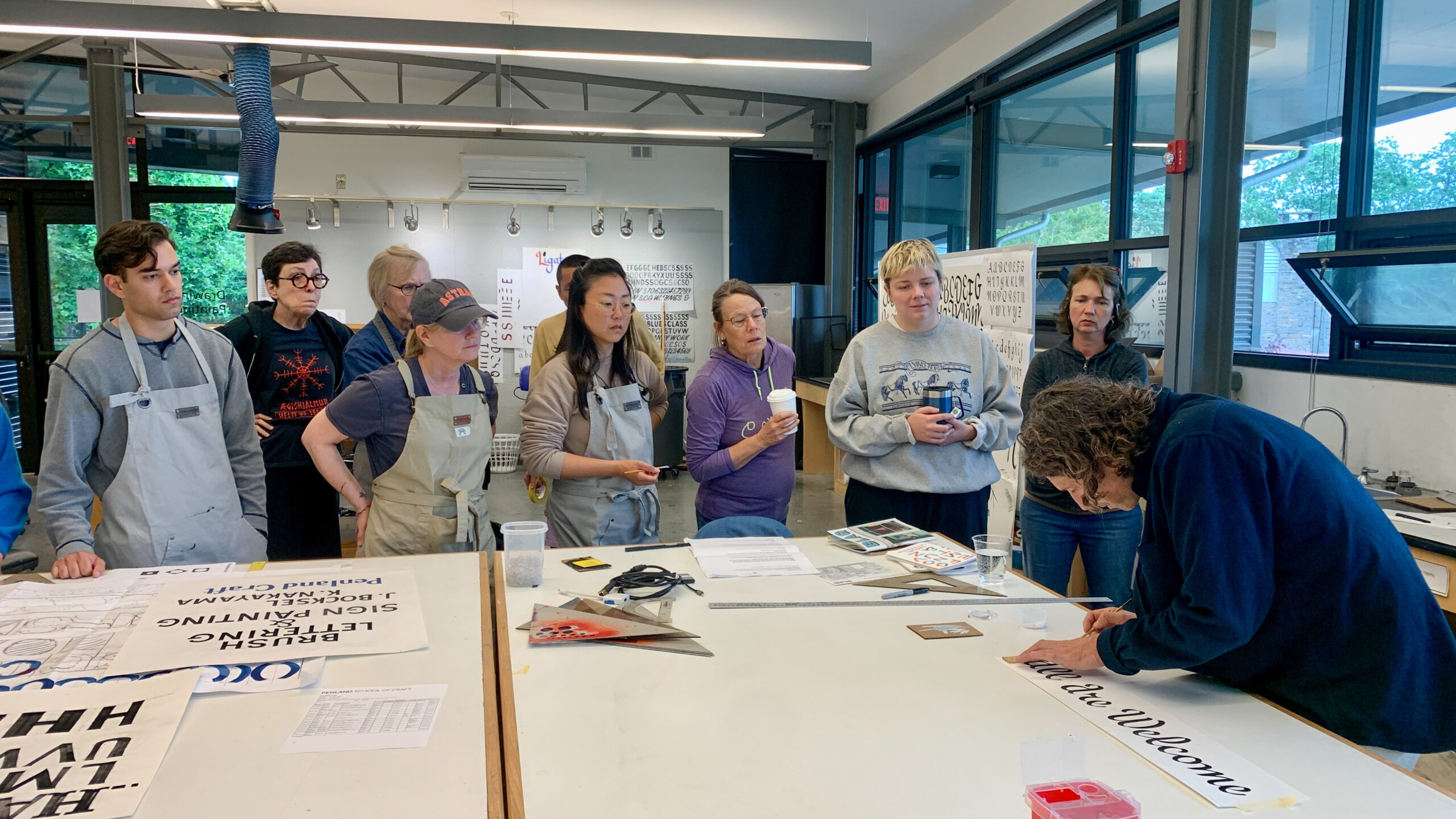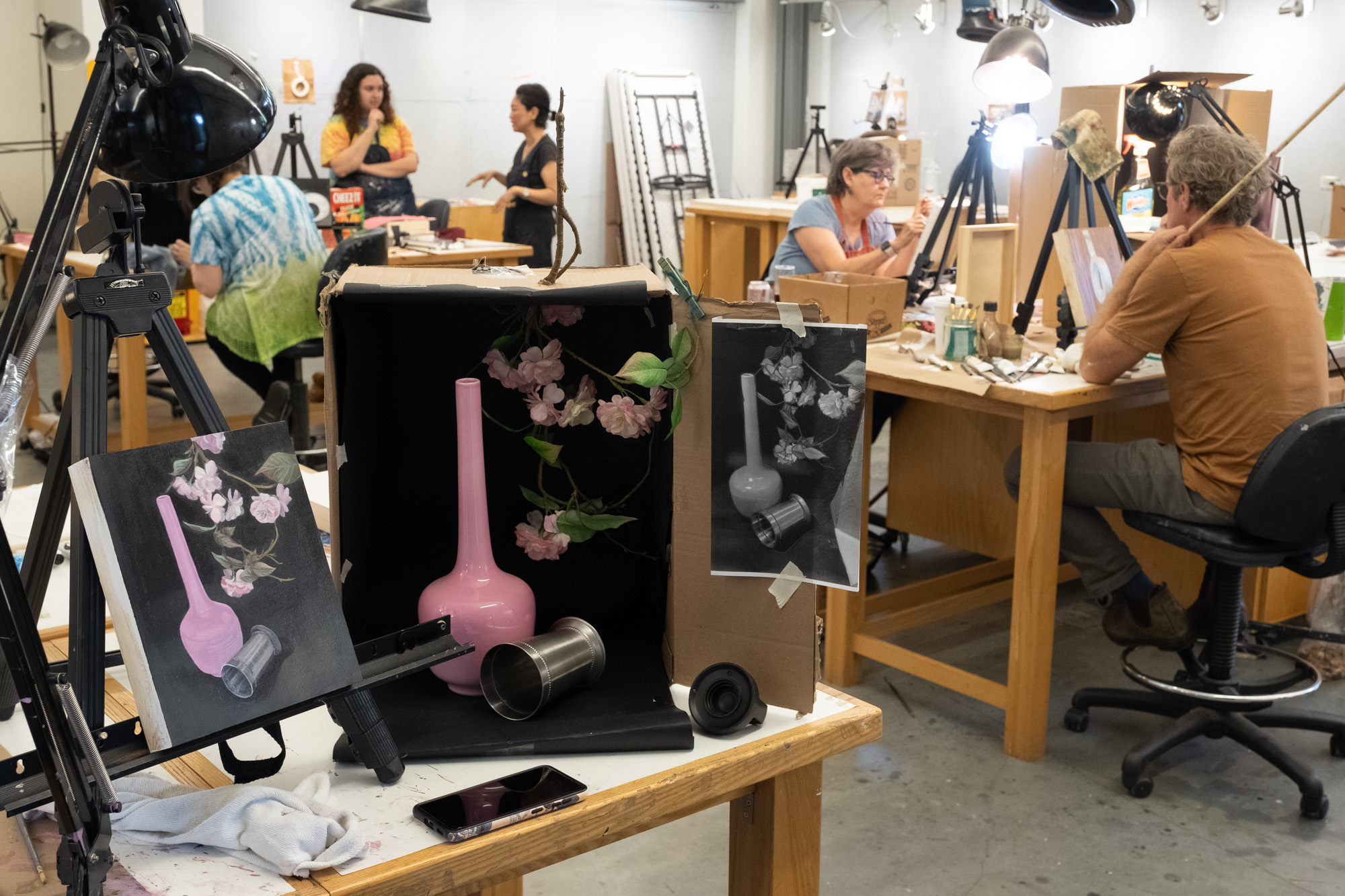Penland Drawing & Painting Program

The Penland drawing and painting program offers beginning to advanced workshops in traditional and contemporary methods. The drawing and painting studio provides the space and equipment to explore image-making through the lens of materials and craft, via work in primarily two-dimensional formats. The technical and conceptual scope of each workshop is determined by the instructor with input from our program director and support from our programming staff. Our versatile facility and high caliber artist/educators allow us to provide relevant programming in topics from classical figure drawing to experimental mark making and mixed media assemblage and everything in between. We strive for a balance of technical and aesthetic content and value all cultural and historical perspectives. We offer workshops that inspire and challenge students from curious beginners to accomplished professionals. Our programming is current in spirit and respectful of craft traditions.
Traditional drawing and painting materials (such as oil, acrylic, watercolor, encaustic, egg tempera, pencil, charcoal, pastel, ink, etc.) as well as other approaches such as collage, digital imagery, photo transfer, and sign painting, may be used observationally with subjects such as figure, still life, and landscape or in the exploration of abstraction, ideation, and the expressive qualities of materials. Topics also include design and composition, color theory, and idea generation. Recent instructors include Ruth Waller, Joseph Hart, Steve Johnson, Pinkney Herbert, Holly Roberts, Lisa Pressman, Clarence Morgan, Jill Eberle, Henrik Drescher, Lauren Fensterstock, Arthur Gonzalez, Michael Dixon, Alicia Keshishian, Brandon J. Donahue, and Robert Johnson, among many others.
Our workshops take place in a well-equipped, well-maintained, and safe studio designed to accommodate diverse content and working styles. There are work tables and/or easels for each student, pin up space, and covered outdoor work and meeting spaces.

Equipment—General Studio Area
This list of equipment is intended to give you an idea about what the Drawing and Painting studio is like. Keep in mind that, although this equipment is available in the studio, if something is not necessary for your class, it may not be prepared or available for use. The equipment used by your class will be determined by your instructor and will be appropriate to the techniques covered in your class. This is a general description of equipment and may change before your session.
14 work tables with adjustable drafting table top
Chairs
Stools
13 aluminum easels
11 Winsor & Newton Bristol Watercolour portable, aluminum landscape easels
Clamp-on desk lamps
Masonite boards in assorted sizes, largest 4′ x 4′
Sketch boards with clips, 23.5″ x 26″
Folding tables
Utility sink with emergency eyewash station
1 Saturn Tensor 18 Drying Rack with 40 trays
3 flat files, 5 slots each
Box fans
12 self-healing cutting mats; 24″ x 36″
12 metal T-squares, 36″ long
Extension cords
1 X-Acto Commercial High Volume electric pencil sharpener
Arrow T50 staple guns
R&F palettes and skillets and griddles for Encaustic painting
Heat guns
BernzOMatic propane torches
Assorted mud lamps
3-roll Vertical Paper Roll Rack
Anti-fatigue mats
Students are responsible for any servicing and/or replacement needed for any of the studio equipment used during their class.
Supplies and Materials
Shared class supplies (specific material items requested by your instructor) can make up part of a Studio Fee. You will be notified in advance with the amount of the estimated Studio Fee for your class in your Student Information Packet.
If your class requires hazardous materials, they will need to be disposed of properly. A Hazardous Waste Disposal Fee will be charged in addition to the Studio Fee.
In order to limit the hazardous waste generated in the studios, Penland cannot allow students to bring toxic materials onto the campus UNLESS they are listed on the Student Materials List. Any materials that you bring with you that are not listed on the Student Materials List MUST be NON-TOXIC. All materials brought onto the Penland campus must be in their proprietary (original) packaging.
Resale
The studio may stock a small selection of materials based on instructors’ requests. Such requested resale items are sold through the Drawing and Painting Studio by the studio assistant during scheduled times. Please refer to the Student Materials List for specifics on materials needed for your class.
Student Workspace
The Drawing and Painting Studio is a communal workspace. Students are provided with a work table and/or an easel, a clamp-on desk lamp with a full-spectrum bulb, a chair, and small shelves to hold their drawing and painting supplies. Students are welcome to bring favorite personal hand tools, lighting, and/or seating for use in the studio.
Safety Information
The Studio Coordinator gives a mandatory safety walk-through at the beginning of every class. The walk-through informs you how to safely operate equipment and work in the studio space, as well as what the safety procedures are in case of an emergency.
A first aid kit, fire extinguishers, an emergency eyewash station, a Material Safety Data Sheet (MSDS) binder, and a flammable cabinet are provided in the studio.
A Hazardous Waste Station is also in the studio for disposal of spent solvents/chemicals and solvent rags. A spill kit is provided in case of small spills of caustic, flammable, or corrosive materials.
North Carolina health regulations do not permit Penland School to provide dust masks, respirators, gloves, aprons, and other safety equipment for shared use. Please refer to the Student Materials List for specifics about safety equipment needed for the class. Some items may be available for purchase at the School Store.
Alcohol consumption is not permitted in the studios. Working in the studios under the influence of alcohol is not permitted. The use of illegal drugs is prohibited on Penland’s campus.
Shared Studio Equipment
Besides shared equipment, it is important to note that the Drawing and Painting Studio is a shared space.
Shared air space/music: each class should discuss the playing of music and reach a consensus on the time of day, the volume, and the type of music to be played. Tolerance and consideration are expected from everyone.
If you wish to use equipment in other studios during your session, you must contact the Studio Coordinator who oversees that particular studio first. If permission is granted, then you must work with the instructor, studio assistant, and studio coordinator of that studio to arrange access. They will determine if the desired usage is compatible with their class’s activities and if you are able to work safely and independently with the equipment.
Clean Up
The whole class is asked to participate in weekly clean-up sessions and a FINAL clean up at the end of the class.
Session Schedule
Each session starts with an all-school meeting Sunday evening at 5pm followed by dinner in the Pines. Classes start Sunday at 8 p.m. Studio clean-up takes place the day before your session ends. The last day of each session is reserved for farewells and an all-school show-and-tell of work created during your time at Penland.
Everyone must participate in studio clean-up; if you must leave early, please ask the studio assistant to assign you clean-up tasks you can accomplish before your departure.
If you have questions, contact:
Studio Coordinator, Megan Roche
828.571.3128
photo@penland.org
Work as a Figure Model at Penland
We are always looking for figure models in both the Drawing & Painting and Clay studios. Apply to be a model by filling out this form:
Figure Model Application
Please provide us with the best information by which to contact you and provide a letter of recommendation from someone who can speak to your professional work as a model in Word Doc or PDF form including their contact information.
We will contact you if there is a class that needs a model. Thank you.


